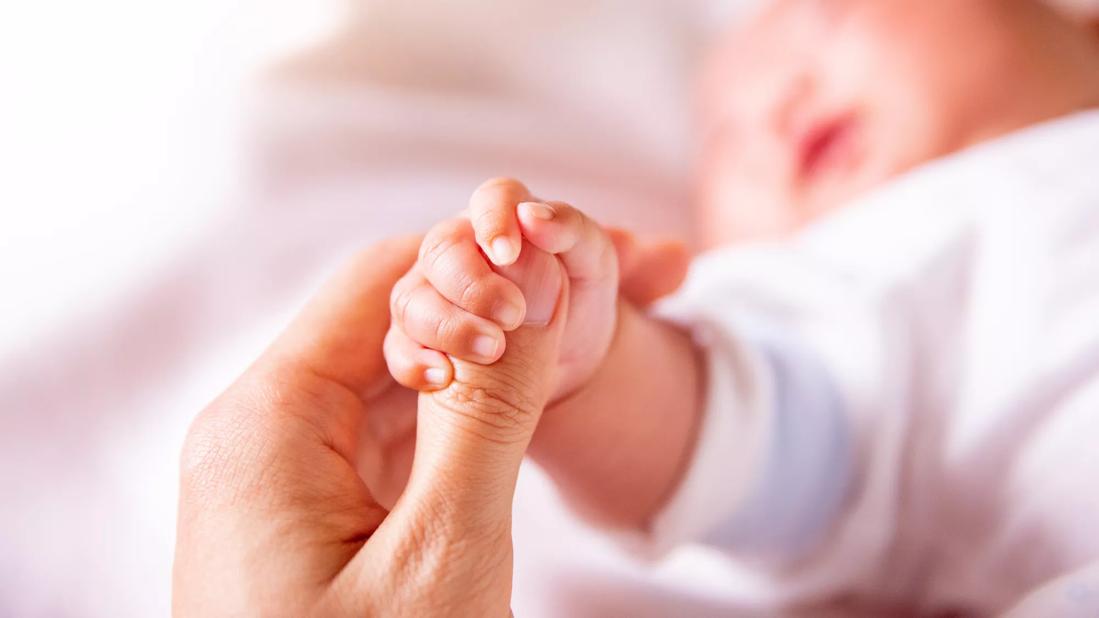Lanugo — the soft, fine hair that develops in utero — is harmless and will shed within a few weeks

Image content: This image is available to view online.
View image online (https://assets.clevelandclinic.org/transform/f545407d-3848-4bb9-a82d-ed87eb71e10f/baby-1139448133)
Newborn's tiny hand gripping caregiver's thumb
There’s nothing quite like the baby-soft skin of a newborn. But some adorable little ones show up a bit … fuzzier than you’d expect. It’s cute, but is it cause for concern?
Advertisement
Cleveland Clinic is a non-profit academic medical center. Advertising on our site helps support our mission. We do not endorse non-Cleveland Clinic products or services. Policy
Pediatrician Rajyalakshmi Rambhatla, MD, explains why some newborns have hair on their body, and when you can expect it to go away.
It’s completely normal for a newborn baby to have body hair, especially if they were born before 37 weeks. And a hairy baby isn’t a sign that your newborn will become a hairy child or adult. (Not that there’s anything wrong with that!)
The body hair you commonly see on a preterm baby is a special kind of hair called lanugo.
“Lanugo is a soft, fine coating of hair that’s essential for fetal growth and development,” explains Dr. Rambhatla. “Most fetuses naturally shed their lanugo before 36 to 37 weeks gestation, which is why we typically don’t see it on full-term babies.”
About three months into a pregnancy, a fetus starts to grow a coating of lanugo. “The lanugo growth usually starts on the forehead area and spreads until their body is covered,” says Dr. Rambhatla.
Lanugo plays a vital role in fetal development because it encourages vernix — a white, cheesy-like substance — to stick to the skin. Vernix is important because it:
Advertisement
Lanugo also plays an important role in fetal development.
“As the lanugo swishes around in the amniotic fluid, the tiny hairs vibrate,” explains Dr. Rambhatla. “The vibrations send messages that stimulate fetal growth. Once the lanugo starts to naturally shed in late pregnancy, it sends the signal that the growing process can slow down.”
Useful as lanugo may be in utero, it may not be a thing you want to highlight in your newborn baby’s photo session. But don’t worry — it won’t stick around for long. Your newborn will likely be lanugo-free within a few weeks after birth.
“Very preterm babies tend to have lanugo longer than babies born at 36 weeks or later,” clarifies Dr. Rambhatla. “Lanugo will fall out when the baby approaches their full-term development.”
In the meantime, just let the baby fuzz be. Lanugo doesn’t bother your baby, but trying to remove it probably will.
“It’s not safe to use hair removal methods on babies,” adds Dr. Rambhatla. “Their skin is much more sensitive than adults.”
Some babies are born with a full head of hair, only to go bald within the first few months of life. But head hair isn’t the same type of hair as lanugo. And the reason for hair loss is different.
“Babies may lose some or all of the hair on their heads due to a natural drop in hormones,” explains Dr. Rambhatla. “At about 3 months of age, the hormones that a baby got from their mother are gone, and sometimes, they take head hair along with them. But don’t worry, their hair will grow back in a few weeks.”
Your baby might also acquire a bald spot on the back of their head. This spot usually results from spending a lot of time sleeping on their back.
“Your baby’s bald spot will fade once they are rolling over on their own and sitting up,” he continues. “Back sleeping is the only safe way for newborns to sleep, so don’t put them in another position to avoid hair loss.”
Whether it’s lanugo or head hair, your baby’s locks are as unique as they are. Don’t worry if they’re extra hairy (or totally bald) for those first few months.
“You don’t need to provide any special care for lanugo, aside from bathing your baby with a gentle cleanser designed for infants,” says Dr. Rambhatla. “And if you want to style the hair on your baby’s head, use a soft headband. Avoid tight hairstyles, which can be painful for your baby’s sensitive scalp.”
Finally, remember that your pediatrician is here to help you through the exciting — and sometimes exhausting — job of parenting.
“It’s normal to have questions when your baby arrives, even if you have other children,” reassures Dr. Rambhatla. “Don’t be afraid to speak up if you have concerns about your baby’s well-being. We’re here to support you.”
Advertisement

Sign up for our Health Essentials emails for expert guidance on nutrition, fitness, sleep, skin care and more.
Learn more about our editorial process.
Advertisement
Most teething symptoms are mild — fevers and other major symptoms are likely something else
Most babies will crawl between 7 and 10 months old, but later can be normal, too
Adding extra formula, cereal or medications to your baby’s bottle is a dangerous and misguided practice
Teaching your baby to sign may help ease frustrations before they can talk, but it’s not a must-do
Babies can get congested easily, but you can calm their cough by keeping them hydrated, using nasal drops and running a humidifier
Try to burp your baby mid-feed and after they finish eating — but don’t sweat it if they don’t burp
Most babies will recognize their name by about 9 months old
Clean your baby’s mouth with a washcloth or small toothbrush if they have a tooth or you suspect thrush
Prioritize your health by managing stress, strengthening your social connections and getting quality sleep
Bolsters, blankets, pillows and blocks can offer extra support, stability and comfort
Allergies, postnasal drip, asthma or reflux could be to blame for a cough that won’t quit